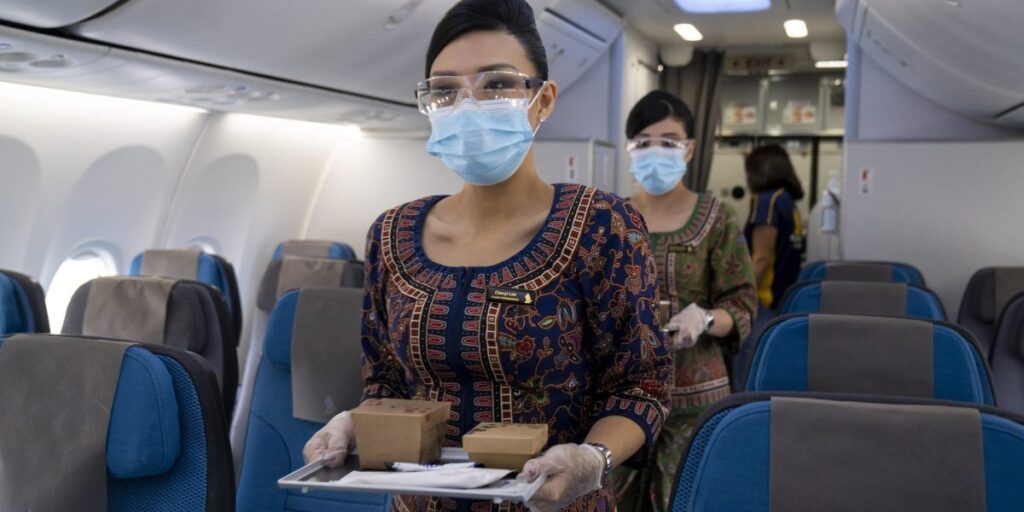
Singapore Airlines staff are set to receive huge bonuses when this year’s annual bonus rolls around.
According to CNN, the airline plans to give bonuses to employees equal to eight months’ salary.
This is a tumultuous time for the aviation industry. Boeing’s safety woes earlier this year rocked an industry that lives and dies on consumer confidence. A group of whistleblowers claim there was a rampant culture of corner-cutting that led to negligence that led to multiple aircraft failures. Even before then, the U.S. airline industry was reeling from a lack of capacity that led to widespread delays and cancellations during the peak spring and summer travel seasons. Most notably, Southwest’s reservation system crashed after a December 2022 winter storm, leading to 16,900 cancellations. The airline was later forced to pay a $140 million fine over the incident.
However, Singapore Airlines appears largely unaffected by the problems plaguing its peers. Earlier this week, the airline reported its best-ever financial results, with revenue of $14.1 billion and net profit of $1.9 billion for fiscal 2024. Employees earned equally generous bonuses.
The company did not immediately respond to a request for comment.
Singapore Airlines’ excellent financial performance over two years has been helped by positive macro trends. As the city-state of Singapore emerges largely unscathed from the impact of the pandemic and continues to grow, so does its national airline’s business. As a luxury airline, Singapore Airlines has also benefited from the latest industry-wide trend of consumers favoring luxurious airlines over those with shabby amenities. So much so that companies like Singapore Airlines have spooked staid established airlines into trying to copy their ubiquitous brand of comfort.
In recent years, Singapore Airlines has become known for its luxurious aircraft and facilities. Its first-class travel package includes a private suite, similar to a sleeper car on a train, and costs about $23,000. Even though Singapore Airlines’ flights are cheaper, they offer all kinds of little comforts, like a selection of champagne and comfy pillows.
Another airline known for its luxury travel accommodations also enjoyed a blowout for the second year in a row. Emirates airline from the United Arab Emirates earlier this month paid bonuses worth 20 weeks’ salary to employees. Last year, employees received larger bonuses equivalent to 24 weeks’ pay.
Across the industry, luxury airlines have been beating out their more traditional competitors by offering more amenities at more affordable prices. A new wave of luxury airlines, many of them from smaller countries like the Maldives and Bermuda, is forcing legacy airlines to catch up, and major U.S. airlines are planning to increase their premium cabin space from 25% to 75% in their on some planes.
Emirates and Singapore Airlines both benefit from strong economies in their countries, adding further impetus to their sailings. The UAE economy has impressed in recent months for its ability to weather the storms of geopolitical instability. This can largely be attributed to the oil-rich country’s efforts to diversify its economy, in which national assets like airlines play a significant role. So far, the effort has yielded good results. In April, the UAE reported GDP growth of 3.3% in the first nine months of 2023.
Meanwhile, Singapore, one of Asia’s major financial centers, has been viewed as an economic miracle since its founding in 1965 as a small city-state at the tip of Peninsular Malaysia. This year, its economy is expected to strengthen, mainly due to large exports of electronic products. Singapore has been able to maintain some economic viability during the pandemic by attracting foreign investment and multiple vaccine factories.
All this puts Singapore in a good position to get off to a fast start in 2022 when pandemic-era restrictions are lifted. The airline lost $1.75 billion in the three months from July to September 2020.
Now, the rally appears to be complete. As of March, the airline reported that its passenger numbers were 97% of pre-pandemic levels. There is reason to believe these numbers could improve. The company’s chief executive Goh Choon Phong said on Thursday that outbound travel had not yet returned to pre-pandemic levels.

